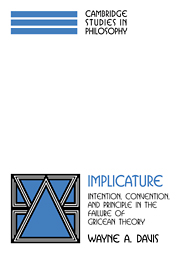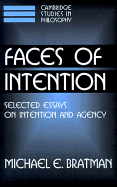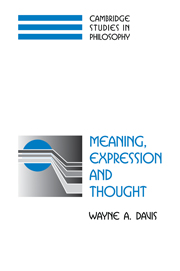Implicature
H. P. Grice's theory of implicature provides the leading paradigm for research in pragmatics. Wayne Davis argues controversially that Gricean theory does not work. In developing his argument the author explains that the psycho-social principles actually define the social function of implicature conventions, which contribute to the satisfaction of those principles. By offering a searching and systematic critique of one of the established doctrines in the philosophy of language, this challenging book will be of particular importance to philosophers of language and linguists, especially those working in pragmatics and socio-linguistics.
- Argues against theories of H. P. Grice that have dominated the field of pragmatics
- Genuine interdisciplinary interest to philosophers of language and linguists
Reviews & endorsements
"...an insightful, meticulously researched and challenging work that no student of pragmatics can afford not to master." Philosophy and Phenomenological
Product details
July 2007Paperback
9780521038065
216 pages
215 × 140 × 12 mm
0.286kg
Available
Table of Contents
- Introduction
- Part I. Concept and Theory:
- 1. The concept of implicature
- 2. Theoretical importance
- 3. Gricean theory
- 4. Grice's razor
- 5. Sufficiency
- Part II. Differentiation:
- 6. Quantity implicatures
- 7. Tautology implicatures
- 8. Conjunction implicatures
- 9. Idioms
- 10. Non-Gricean speech
- Part III. Determinacy and Calculability:
- 11. Background constraints
- 12. The meaning constraint problem
- 13. The rhetorical figure problem
- 14. 'Indeterminate' implicatures
- 15. Relevance implicatures
- 16. Close-but implicatures
- 17. Quantity implicatures: the possibility of ignorance
- 18. Quantity implicatures: other possibilities
- 19. Tautology implicatures
- 20. Conjunction implicatures
- 21. Conflicting principles
- 22. 'Relevance' theory
- 23. Modal implicatures
- Part IV. Presumption and Mutual Knowledge:
- 24. The cooperative presumption condition
- 25. The presumption of relevance
- 26. Mutual knowledge
- 27. Meaning versus communication
- 28. Implicature and inference
- 29. The recognition of implicature
- Part V. The Existence of Implicature Conventions:
- 30. Conventions
- 31. Quantity implicatures
- 32. Tautology implicatures
- 33. Conjunction implicatures
- 34. Disjunction implicatures
- 35. Modal implicatures
- 36. Figures of speech
- 37. Relevance implicatures
- 38. Close-but implicatures
- 39. Manner implicatures
- 40. Interrogative and imperative implicatures
- Part VI. The Nature of Implicature Conventions:
- 41. First-order versus second-order semantic conventions
- 42. Idioms
- 43. Indirect speech-act conventions
- 44. The role of conversational principles
- 45. The principle of antecedent relation
- 46. The universality of implicature conventions
- 47. Conclusion
- References
- Index.




